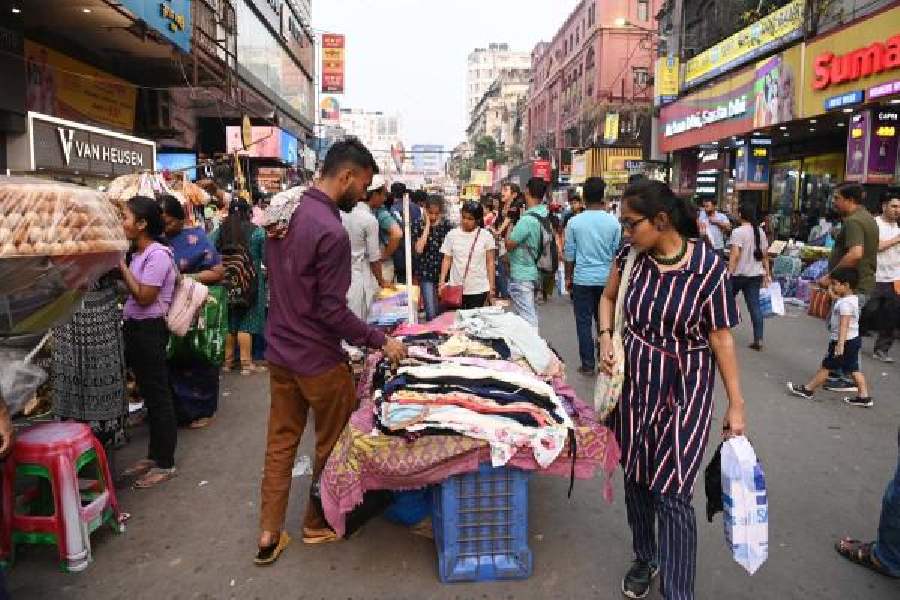Hawkers across Calcutta are back to their old ways, encroaching on roads, putting up tarpaulin sheets and occupying more than the stipulated space on footpaths, The Telegraph saw on Sunday.
At the Oberoi Grand arcade, the hawkers kept the tables displaying their wares within the stipulated one-third width of the pavement but the sticks put up at the stalls extended beyond the allotted space.
Garments were hung from the sticks for display.
Pedestrians found it difficult to make their way through the arcade because of the stalls.
The street vending rules, notified by the state government in 2018, mention that no stall can occupy more than one-third width of a pavement.
Along Lindsay Street, hawkers encroached on almost the entire pavement leaving a sliver of passage for pedestrians. Most pedestrians preferred walking through the carriageway as moving through the pavement meant jostling with hawkers and their customers for space.
The Lindsay Street pavements were clogged with hawkers and their customers at 3.30pm on Sunday. Portions of the stalls encroached on the road, too, especially opposite the southern gate of New Market.
Frequent visitors to the New Market area said hawkers play the cat-and-mouse game with the police. They remove their stalls at the sight of the police but set them back up as soon as the cops leave the stretch.
Almost one-third of Bertram Street and the pavements along the road were occupied by hawkers.
A vendor who set up a stall on Bertram Street said he used to sit on the pavement along Humayun Place but had to leave at the police’s orders.
“The police asked me to remove my stall from the Humayun Place pavement. I now sit wherever I get a place,” he said.
“We keep adjusting our shop, bringing it forward or taking it back, as the situation demands. I had a stall on the pavement but shifted it to the road after being told by the police,” said a hawker with a stall selling women’s garments on Lindsay Street.
Plastic sheets and dirty bedsheets, too, have returned. At Gariahat, multiple stalls were seen wrapped with plastic sheets or dirty bedsheets.
“Any structure with tarpaulin or any other inflammable article shall not be allowed,” says the West Bengal Urban Street Vendors (Protection of Livelihood and Regulation of Street Vending) Rules, 2018.
A vendor who sells women’s wear at Gariahat said they had no other option but to place the tarpaulin sheets to protect their wares.
“We use tarpaulin sheets to protect our items from dust. We remove the sheets whenever the police or the KMC officials ask us to,” said a hawker.
Debasish Das, a member of Calcutta’s town vending committee, said hawker unions were again told in January to remove tarpaulin sheets from their stalls.
The committee has been empowered by the Street Vendors (Protection of Livelihood and Regulation of Street Vending) Act, 2014, a central law, to penalise errant hawkers and take measures to protect their livelihood. Every town or city in the country must have its town vending committee.










